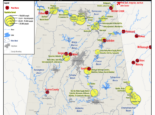Cleaning up coal ash pollution
What is coal ash?
Nearly every major river in the South has one or more unlined, leaking pits filled with coal ash from power plants on its banks and sitting in groundwater. Containing millions of tons of toxin-laden coal ash pollution, most of these pits are unlined and have leaked arsenic, mercury, thallium, selenium, and other harmful contaminants into rivers, lakes, streams, and the underlying groundwater for decades.
Protecting our water and health from coal ash pollution for over a decade
For more than 10 years, we have fought in federal and state courts to force utilities to clean up their unlined, leaking coal ash pollution and protect our clean water and people’s health. When state and federal governments did not act following a devastating 2008 spill in Kingston, Tenn., we began enforcing the Clean Water Act ourselves on behalf of local citizen groups to secure coal ash cleanups across the South. As a result of our work, all unlined coal ash pollution pits in North Carolina, South Carolina, and Virginia are being cleaned up and utilities in the Southeast are removing over 270 million tons of coal ash from unlined, leaking pits across the region. We continue to push utilities to clean up their coal ash pollution in Tennessee, Georgia, and Alabama to protect Southern communities.
Historic cleanup of coal ash pollution
In North Carolina, our lawsuits on behalf of community groups resulted in the largest coal ash cleanup in the nation through enforceable commitments to excavate or recycle 126 million tons from all 14 of Duke Energy’s leaking, unlined coal ash pollution sites across the state. A historic settlement in January 2020, negotiated by SELC with the Department of Environmental Quality and Duke Energy, marked the finale of years of administrative and legal actions seeking coal ash pollution cleanups in North Carolina.
This timeline of North Carolina’s coal ash history highlights key moments, including Duke Energy’s coal ash spill into the Dan River in North Carolina and criminal plea deal for Clean Water Act crimes.
SELC first went to court to seek cleanup of coal ash pollution on behalf of community groups in South Carolina in 2012. Now, every utility in South Carolina is excavating its coal ash from every unlined, leaking lagoon in the state, and cleanups are underway at every coal ash pollution site in North Carolina. Coal ash has been, is being, and will be removed from coal ash pollution pits owned by three utilities on rivers that flow through both states.
These agreements are the culmination of nine years of work by communities across North Carolina and put in place the most extensive coal ash cleanup in the nation. North Carolina’s communities will be safer and North Carolina’s water will be cleaner than they have been in decades.
Frank Holleman, SELC senior attorney
Following our efforts to clean up coal ash contamination leaking from three different Dominion Virginia Power facilities, Virginia enacted legislation in 2019 requiring Dominion to excavate all of its coal ash pollution pits in the Commonwealth. Then, Virginia passed legislation requiring Appalachian Power to excavate its sole active unlined coal ash lagoon in the state, on the New River.
After years of our work to uncover violations and enforce the Clean Water Act, the Tennessee Valley Authority settled litigation with the state of Tennessee and conservation groups represented by the Southern Environmental Law Center in 2019 by agreeing to remove 12 million tons of coal ash from an unlined pit on the Cumberland River near Nashville, which provides drinking water for 1.2 million residents downstream. And after years of advocacy by SELC and its partner groups, TVA finally agreed to remove all the coal ash from its dangerous coal ash pollution site near Memphis.
In Georgia, we worked with riverkeepers and community groups to push Georgia Power to clean up its unlined coal ash storage. As of 2022, Georgia Power is committed to remove 65% of its coal ash from unlined pits, and we continue to work to force Georgia Power to finish the job.
To force Alabama Power to act responsibly, in 2022 we filed suit for the Mobile Baykeeper to require the cleanup of that utility’s coal ash lagoon at Plant Barry on the banks of the Mobile River upstream from Mobile. Millions of tons of coal ash sit on the edge of the Mobile-Tennsaw Delta, a national ecological treasure, where the coal ash is subject to hurricanes, storms, flooding, and water level rise.
Fight continues for tough standards on coal waste handling
Despite the dangers revealed by the catastrophic Kingston spill in 2008 and the 2014 Dan River spill in North Carolina, only in 2015 did the EPA put its coal ash rule (known as the Coal Combustion Residuals or CCR Rule) into effect. Under the Trump administration and at the request of coal ash polluters, EPA weakened some of the rule’s requirements for safer disposal of coal ash. We worked with allies across the nation to push back on those rollbacks. After the election of the new administration in 2020, we continued to push EPA for stronger protections for communities in the Southeast. The EPA under the Biden administration has begun to enforce the CCR Rule in ways that will do more to protect clean water and the people who live near rivers and lakes where coal ash has been stored.
We will continue to enforce the law to protect rivers and communities from the dangers of coal ash and to seek stronger action in defense of our region and our clean water.






